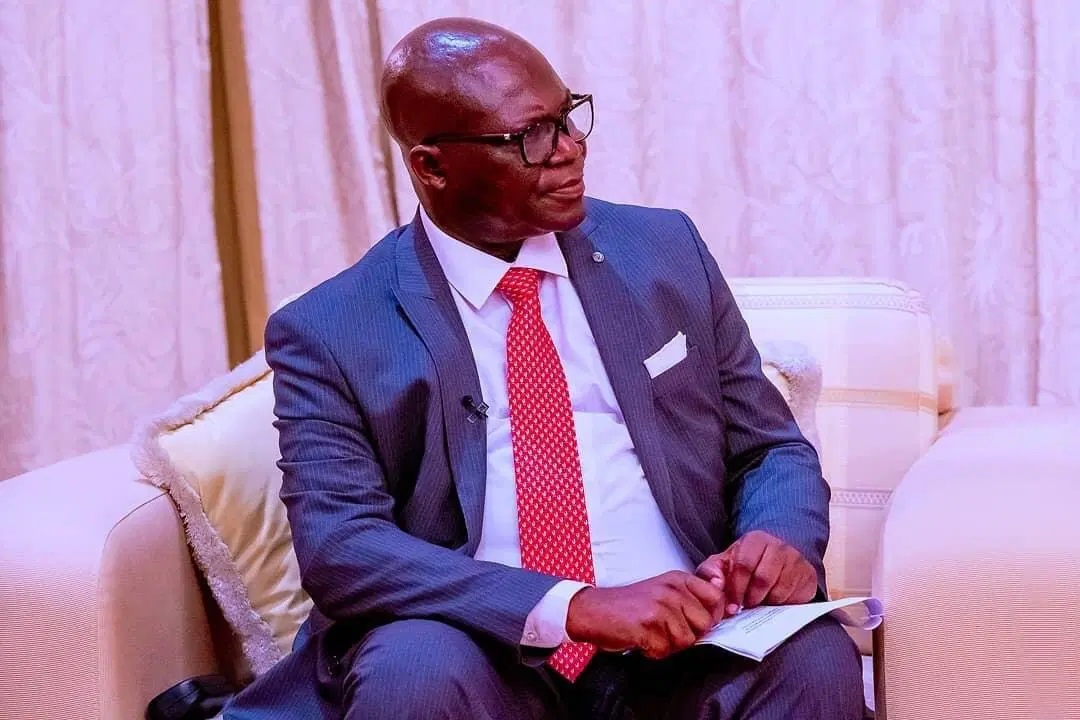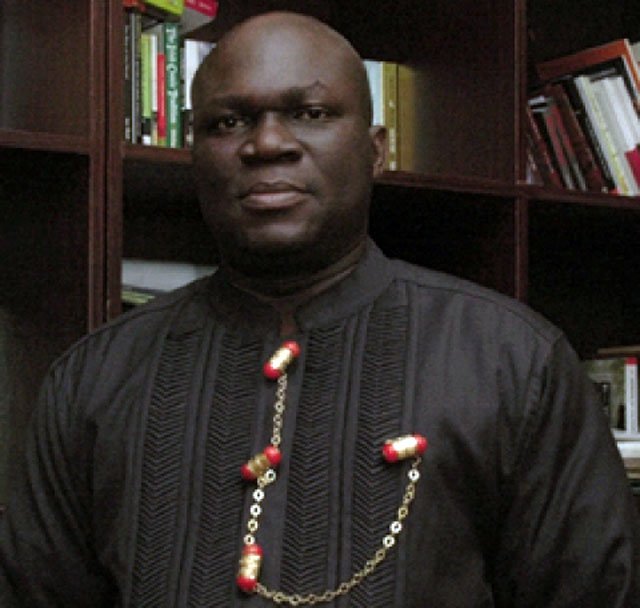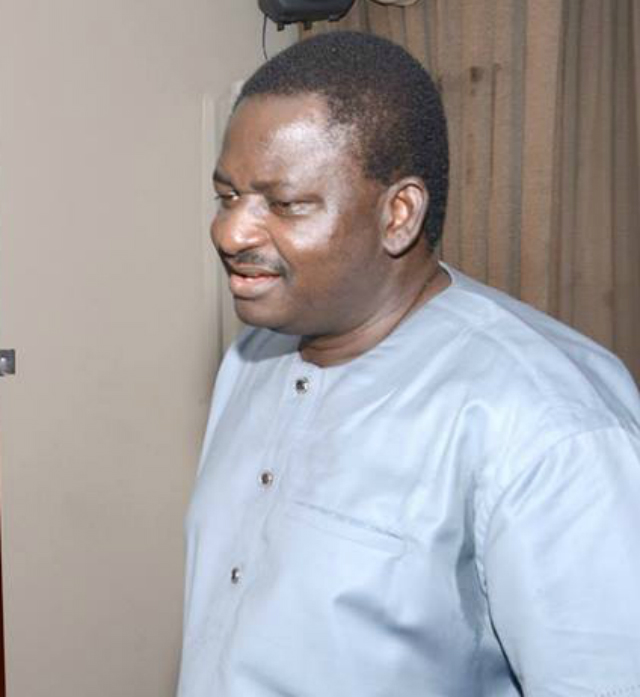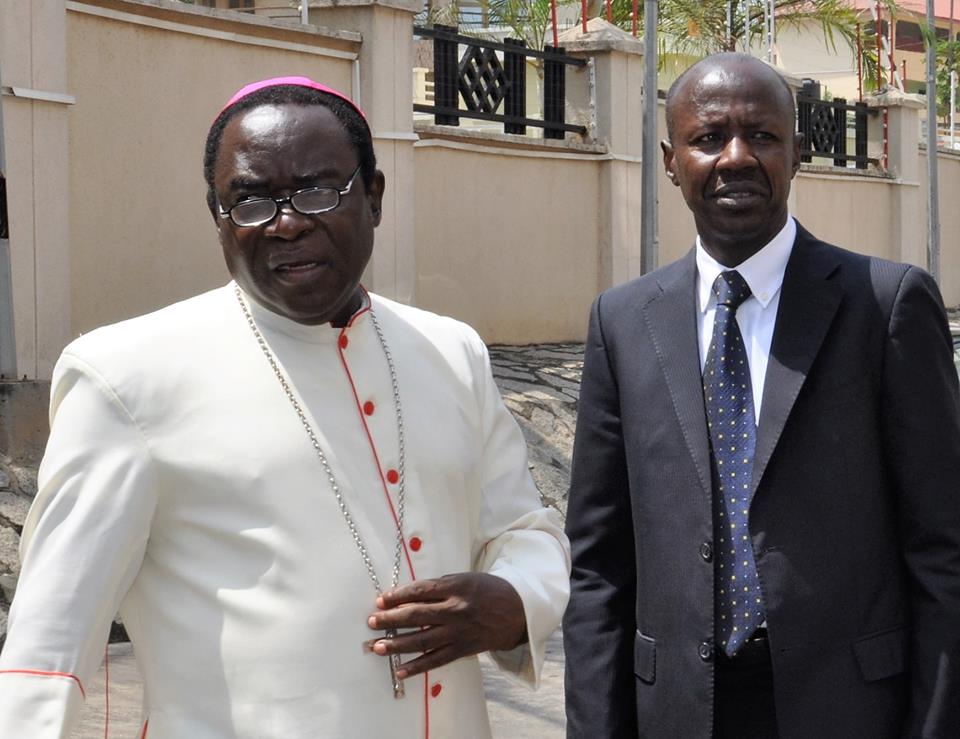Feature/OPED
The Two Faces of Tuface


By Reuben Abati
Tuface’s decision to lead a protest to register the dissatisfaction of Nigerians with the performance of the incumbent administration and to reiterate the value of government’s responsibility to the people was his finest moment as a citizen and artiste. But it is also now, with his Jammeh-like volte-face, his worst moment.
His transformation into a champion of democratic values and voice of the masses brought him added stardom and value. His retreat has turned him into a revolutionary manqué. He deserves our understanding and sympathy.
When on 24th January Tuface (Innocent Dibia) announced that he was going to lead, under the umbrella of the Tuface Foundation, a mass protest against the economic policies of the Buhari government, he immediately attracted public interest. A multiple award-winning musician, a naturally talented stage performer and author of at least two evergreen songs: “My African Queen” and “If Love is a Crime”, TuBaba, as he is also known, sounded like he was moving from art to politics, and seemed ready to answer to the true calling of the artist as the conscience of the people.
Artists and creative persons have always led protests and lent their voices to progressive causes. That much is the case in the United States at the moment, where artistes have raised their voices and joined protests to remind the “insurgent in the White House” that America is a land of freedom, democracy and justice and not bigotry and tyranny. Here at home, Fela, and his cousin, the Nobel Laureate Wole Soyinka, Chinua Achebe and others as well, have shown the power of creativity and stardom as a veritable vehicle for social change and justice. Artists and their art, and their movement from stage, or the printed page, to the public arena of action have always saved humanity, by humanizing man. This has been the case from Sophocles, all through time and history to Olanrewaju Adepoju, Beyonce and Kanye West.
But activism comes with a price. Tuface obviously didn’t bargain for that. He received enormous support. His announcement of the February 5, later February 6 protest energized the angry, frustrated Nigerian base, and drew our unrelenting “children of anger” back into an overdrive on social media. The international community also became interested, waiting to see the effect of a protest driven by star-power in Nigeria. It was coincidentally a season of protests across the world: in the Gambia, there had been protests against Yahyah Jammeh with a positive outcome, in the US, the UK and elsewhere, Donald Trump’s travel ban on seven Muslim-majority countries and his misogyny led to protests on both counts, and in the case of the former, a Federal judge has given a ruling that has resulted in the suspension of the ban. In Cameroon, concerned citizens are protesting over discrimination against English-speaking Cameroonians. In Romania, a sea of protesting citizens has just had its way. There is all around the world, right now, a resurgence and affirmation of people power, be it Brexit or left-wing activism in Europe. Individuals and groups lead such moments in history- what makes them different is the fire in their bellies and their readiness to command the revolution, at great personal risk.
It looked initially as if Tuface had that burning fire in his belly, but he couldn’t make that leap between self-preservation and the risks of rebellion. He had appeared on television. He spoke confidently about the need for real change in Nigeria. He encouraged Nigerians to come out en masse to support the movement. He even announced the colour and dress code of the protest. His wife stood by him and she, too, talked about her husband’s convictions about national progress and good governance. Each time Tuface appeared in the media, during those five minutes in the sun, he looked bright and determined. But everything changed late Saturday evening. The recorded video of Tuface’s volte-face, announcing the cancellation of the Feb. 6 protest showed him looking dispirited, broken, ashen, as if he had been shaken up and chastised. He looked unsettled with his scraggy, uncombed beard. It is not difficult to know when a man’s balls have been squeezed.
Tuface actually deserves our sympathy. He must have gone through a lot of pressures that broke his spirit. His capitulation makes us appreciate even better the heroism of those who always stood up to dictatorships. His example is indeed a great lesson…And I mean that positively for the fact that…Despite the massive support that he received, he also received a lot of discouragement. An old ally of his, some guy appropriately called Blackface was one of the first persons to blacken the idea of the protest. Some Nollywood, belle-forever-face-front-chop-money-money-finish-carry-go characters also opposed Tuface. Some musicians too, although in the long run, Tuface was able to mobilise the support of every section of the Nigerian community at home and in diaspora. By Saturday when he poured cold ice on the whole thing, the protest had even grown beyond him, much larger, with others seizing the initiative and turning what he had thought would be a small show into a nationwide and diaspora event. At that point, Tuface was no longer the singer of sultry songs, but the symbol of a rebellion. The enormity of that potential must have frightened him. He didn’t have the courage to see it through. Leadership is about courage. A coward can never lead a rebellion.
But we should struggle to understand his situation. He was accused of having seven children from three women, which is an absolutely stupid point. An artist does not have to be a saint. We relate to their art and their engagements with society on the basis of the positive value that they bring forth. It is also possible that Tuface received pressures from his multiple in-laws, and even the Baby Mamas defending their stakes in his life. The official wife must have been accused of trying to encourage him to get into trouble so he could get killed and she alone can sit on his estate. The Baby Mamas and all the in-laws must have called to remind him that his children are still very young and he needs to be alive to be their father and so he should think twice before going to use his chest to stop Nigeria Police bullets. Family members, to whom he is obviously a breadwinner, must have advised him to stay with his singing and dancing and not get involved in politics. They would remind him how Fela’s mum got killed and how Fela’s house was razed down, and how every artist who dared the Nigerian government ended up in exile or in prison or with a strange motor accident.
The Nigerian government was of course unhappy with the planned protest, and the idea of it created enormous confusion in Abuja and Aso Rock. While the office of the Acting President spoke about the right to protest and the government not having anything against the expression of fundamental human rights, the Office of the President on vacation made it very clear that the would-be protesters are enemies of the government of the day and sore losers. Those two seemingly contradictory impressions from Aso Rock can only point to one thing: high-level intrigue within. That is probably why the Nigeria Police kept shuffling: we don’t approve of the protest, we do, we don’t, we beg. The timing says it all also. With the President out of the country, and the plan of the protesters to welcome him with a Trump-like protest from Abuja, to Lagos, Port Harcourt, Uyo and Akure, and in parts of the Western world, the damage would have been incalculable. And Tuface would have been held responsible for leading the sabotage. No Nigerian government since 1999 has benefitted from any mass protest. The anti-third term protest hobbled the Obasanjo government. The Jonathan government never recovered from the pro-fuel subsidy protests of January 2012. Tuface and his planned protest had set the stage for a similar prospect for the Buhari government.
What Tuface imagined was a clean-hearted civil action would have resulted in absolute panic, with some informal voices in and around government doing dangerous analysis on ethnic and religious grounds. Reckless hypotheses such as the following: (a) “so, as Baba hand over this thing to Osinbajo so, the only thing his Christian brothers think they should do is to organize a protest in Baba’s absence?” (b) “You don hear say Osinbajo’s office say people have right to protest? So, Baba cannot even travel on vacation again. Walahi, these Yoruba people cannot be trusted.” (c) What are these security people doing? If they are loyal to Baba, by now they should have invited that Tuface, and ask him about the two SUVs that Akpabio gave him and his wife when they got married. They should show him strong evidence that the SUVs were bought with Akwa Ibom state government money and he should pay back the money or get ready to be sued for being an accomplice in a case of diversion of public funds. (d) Or you could have some people affirming the narrative that was put out by the APC and friends of the government of the day viz: “this is the PDP at work. Tuface must be an agent of PDP. Why are our own APC people sleeping? Baba no dey around, they want to pull down the country. So, Tuface is now working with Ayo Fayose of Ekiti, to embarrass Baba? This Osinbajo, can we trust him?”
By pulling the trigger at this time, Tuface simply put a lot of people under pressure and placed their jobs and loyalty at risk -no doubt about it, they must have come after him with a sledgehammer to stop and discourage him. Clear evidence: a counter-revolutionary #IstandwithBuhari protest has already been announced to last for two days. The Tuface revolution that has been abandoned by its main motivator teaches us more lessons about the dynamics of power in Nigeria and the temperament of the resident power elite. Will the protest now take place on February 6, without Tuface? Or will everyone hold fire and down their tools of anger? What is certain, however, is that Tuface is likely to sit at home tomorrow with Anne, his temptingly pretty wife by his side, watching the latest episode of Big Brother Naija on TV, with chicken and salad before him, and a bottle of wine, and one of his hands, innocently setting the stage for the amorous prelude for child number eight. With his wife telling him: “don’t worry yourself dear, Nigeria is not worth dying for. Who wan die make e go die. You have tried your best, my darling husband!”.
That is how many would-be heroes become anti-heroes, and their dreams die a-borning. If the protests go ahead on February 6 as many are threatening, nonetheless, Tuface would lose a lot. If it doesn’t go ahead, he would still lose. The torch of protest that he has lit may not burn on the streets of Nigeria; it is burning already in the minds of the people. He may have chickened out, but he has already achieved the goal of his initial plan. He has by lending his star power to an anti-Buhari protest, expanded the population of angry Nigerians. He has given voice to their anger and fears. His withdrawal from action will not excuse him. Whatever anyone tells him, in the long run, he would still be punished for his bravery and cowardice on both counts. He should not be surprised if for the next few months, he doesn’t get invited to any concert, or performance contract, or if he gets to perform anywhere, he could be booed off the stage. He should not be surprised if his phones stop ringing, or if it rings at all, he could be told: “call me on what’s app I beg, I don’t know if they are monitoring your calls.”
Let no one blame Tuface. His stage name Tuface is the name of Janus: the two-face Greek god, who looks in two directions. When it mattered most in his career, Tuface Idibia answered the call of his name!
Feature/OPED
Daniel Koussou Highlights Self-Awareness as Key to Business Success

By Adedapo Adesanya
At a time when young entrepreneurs are reshaping global industries—including the traditionally capital-intensive oil and gas sector—Ambassador Daniel Koussou has emerged as a compelling example of how resilience, strategic foresight, and disciplined execution can transform modest beginnings into a thriving business conglomerate.
Koussou, who is the chairman of the Nigeria Chapter of the International Human Rights Observatory-Africa (IHRO-Africa), currently heads the Committee on Economic Diplomacy, Trade and Investment for the forum’s Nigeria chapter. He is one of the young entrepreneurs instilling a culture of nation-building and leadership dynamics that are key to the nation’s transformation in the new millennium.
The entrepreneurial landscape in Nigeria is rapidly evolving, with leaders like Koussou paving the way for innovation and growth, and changing the face of the global business climate. Being enthusiastic about entrepreneurship, Koussou notes that “the best thing that can happen to any entrepreneur is to start chasing their dreams as early as possible. One of the first things I realised in life is self-awareness. If you want to connect the dots, you must start early and know your purpose.”
Successful business people are passionate about their business and stubbornly driven to succeed. Koussou stresses the importance of persistence and resilience. He says he realised early that he had a ‘calling’ and pursued it with all his strength, “working long weekends and into the night, giving up all but necessary expenditures, and pressing on through severe setbacks.”
However, he clarifies that what accounted for an early success is not just tenacity but also the ability to adapt, to recognise and respond to rapidly changing markets and unexpected events.
Ambassador Koussou is the CEO of Dau-O GIK Oil and Gas Limited, an indigenous oil and natural gas company with a global outlook, delivering solutions that power industries, strengthen communities, and fuel progress. The firm’s operations span exploration, production, refining, and distribution.
Recognising the value of strategic alliances, Koussou partners with business like-minds, a move that significantly bolsters Dau-O GIK’s credibility and capacity in the oil industry. This partnership exemplifies the importance of building strong networks and collaborations.
The astute businessman, who was recently nominated by the African Union’s Agenda 2063 as AU Special Envoy on Oil and Gas (Continental), admonishes young entrepreneurs to be disciplined and firm in their decision-making, a quality he attributed to his success as a player in the oil and gas sector. By embracing opportunities, building strong partnerships, and maintaining a commitment to excellence, Koussou has not only achieved personal success but has also set a benchmark for future generations of African entrepreneurs.
His journey serves as a powerful reminder that with determination and vision, success is within reach.
Feature/OPED
Pension for Informal Workers Nigeria: Bridging the Pension Gap

***The Case for Informal Sector Pensions in Nigeria
***A Crucial National Conversation
By Timi Olubiyi, PhD
In Nigeria today, the phrase “pension” evokes many different mixed reactions. For many civil servants and people in the corporate world, it conjures a bit of hope, but for the majority in the informal sector, who are in the majority in Nigeria, it is bleak. Millions of Nigerians are facing old age without any financial security due to a lack of retirement plans and a stable pension plan. Particularly, the millions who operate in markets, corner shops, transportation, agriculture, and loads of the nano and micro scale enterprises operators are without pension plans or retirement hope.
From the observation of the author and available records, staggering around 90 per cent of Nigeria’s workforce operates in the informal economy. Yet current pension coverage for this group is virtually non-existent. As observed, the absence of meaningful pension participation by this class of worker reinforces the vulnerability, intensifies poverty among older people, and puts pressure on families who are ill-equipped to shoulder the burden.
The significance of having a pension plan for informal workers in Nigeria, given the large number of people in that sector and the high level of unemployment and underemployment, cannot be overstated. As it is deeply connected to sustenance and the level of poverty in the country. Pension for informal workers in Nigeria is not just a technical policy matter; it is a story about dignity, security, and whether a lifetime of hard work ends in rest or in desperation.
Nigeria’s pension system, primarily structured around the Contributory Pension Scheme (CPS) managed by the National Pension Commission (PenCom), has made significant progress for formal sector employees, yet the large portion of the informal workforce which are traders, artisans, okada riders, small-scale farmers, domestic workers, and gig economy participants who drive the real engine of the economy.
Though the Micro Pension Plan (MPP) was launched in 2019, which is intended to provide a voluntary contributory framework for informal workers, its uptake has been underwhelming; after several years, only a fraction of the millions targeted have enrolled, and far fewer contribute actively. One big reason for this is that, unlike formal workers who receive regular salaries and have employers who deduct and remit pension contributions, informal workers face irregular incomes, a lack of documentation, limited financial literacy, and deep mistrust of government institutions, making traditional pension models ill-suited for their realities.
Moreso the informal worker most times live on day-to-day income. For instance, a motorcycle rider in Lagos who earns ₦14,000 on a good day but must pay for fuel, bike maintenance, police “settlements,” and family expenses, how can he realistically commit to a monthly pension contribution when his income fluctuates wildly? So, the Micro Pension Plan for the informal sector participation will remain low due to poor awareness, complex processes, lack of tailored contribution flexibility, and limited trust.
To truly make pensions work for informal workers, Nigeria must rethink the system from the ground up, designing it around the lived realities of its people rather than forcing them into rigid formal-sector structures. First, the government should introduce a co-contributory model where the state matches a percentage of informal workers’ savings, similar to what is practised in some European countries, turning pension contributions into a powerful incentive rather than a burdensome obligation.
Second, digital technology must be leveraged aggressively—mobile-based pension platforms linked to BVN or NIN could allow daily, weekly, or micro-contributions as small as ₦100, integrating seamlessly with fintech apps like OPay, Paga, or bank USSD services so that saving becomes as easy as buying airtime.
Third, automatic enrollment through cooperatives, trade unions, market associations, and transport unions could significantly expand coverage, with opt-out rather than opt-in mechanisms to counter human inertia.
Fourth, financial literacy campaigns in local languages via radio, community leaders, and religious institutions are essential to rebuild trust and demonstrate that pensions are not a “government scam” but a personal safety net.
Fifth, Nigeria should consider a universal social pension for elderly citizens who never participated in formal or informal schemes, modelled after systems in countries like Denmark and the Netherlands, ensuring that no Nigerian dies in poverty simply because they worked outside formal structures.
Sixth, investment strategies for pension funds must prioritise both security and development—allocating a portion to infrastructure projects that create jobs, improve power supply, and stimulate economic growth while maintaining prudent risk management.
Seventh, inflation protection should be built into pension payouts so that retirees’ purchasing power is not eroded by Nigeria’s volatile economy.
Eighth, the system must be inclusive of women, who dominate the informal sector yet often lack property rights or formal identification, by simplifying documentation requirements and providing gender-sensitive outreach.
Ninth, limited emergency withdrawal options could be introduced—strictly regulated—to help contributors handle crises without abandoning the system entirely.
Finally, transparency and accountability are non-negotiable; regular public reporting, independent audits, and user-friendly dashboards would strengthen confidence that contributions are safe and growing. If Nigeria can blend its innovative spirit with lessons from global best practices—combining Denmark’s social security ethos, Singapore’s savings discipline, and Canada’s inclusivity—it could transform the lives of millions of informal workers who currently face retirement with fear rather than hope.
Imagine Aisha, years from now, closing her market stall not in exhaustion and anxiety but in calm assurance that her pension will cover her basic needs; imagine Tunde hanging up his helmet knowing he can afford healthcare and shelter; imagine Ngozi harvesting not just crops but the fruits of a lifetime of secure savings. The suspense that hangs over the future of Nigeria’s informal workers can be resolved, but only if policymakers act boldly, creatively, and compassionately—because a nation that allows its hardest workers to age in poverty is a nation that undermines its own prosperity, while a nation that secures their retirement builds not just pensions, but peace.
Hope comes from innovation. Fintech-powered pension models that allow small, frequent contributions similar to informal savings associations like esusu offer ways to integrate pensions into existing savings cultures. Making pension contributions compatible with mobile money and agent networks could drastically reduce barriers to entry. Hope comes from public education. Building financial literacy campaigns, partnering with community leaders, marketplaces, trade associations, and digital platforms can help shift perceptions. A pension should be understood not as a distant bureaucratic programme, but as future self-insurance and dignity
The significance of having a pension plan for informal workers in Nigeria, given its large informal sector and high level of unemployment and underemployment, cannot be overstated, as it is deeply connected to social stability, economic sustainability, poverty reduction, and national development.
First, from a social protection and human dignity perspective, a pension plan for informal workers is critical because it provides a safety net for old age. Nigeria’s informal sector includes traders, artisans, mechanics, tailors, hairdressers, okada riders, gig workers, domestic workers, small-scale farmers, and street vendors, many of whom work hard throughout their lives but have no formal retirement benefits. Without a pension, these individuals often become completely dependent on their children, relatives, or charity in old age, which can strain families and increase intergenerational poverty. A well-structured pension system ensures that ageing informal workers can maintain a basic standard of living, access healthcare, and avoid extreme deprivation, thereby preserving their dignity and reducing elderly vulnerability.
Second, from an economic stability and poverty reduction standpoint, pensions play a crucial role in reducing old-age poverty. Nigeria already struggles with high poverty levels, and a large proportion of elderly citizens without income support exacerbates this problem. When informal workers lack pension savings, they continue working well into old age, often in physically demanding jobs, which reduces productivity and increases health risks. A pension system allows for smoother retirement transitions, reduces reliance on welfare, and ensures that older citizens remain consumers rather than economic burdens, thereby sustaining economic activity.
Third, pensions for informal workers are significant for financial inclusion and savings culture. Many Nigerians in the informal sector operate primarily in cash and have limited engagement with formal financial institutions. A pension plan tailored to informal workers, especially one integrated with mobile money and digital platforms, can encourage regular saving, improve financial literacy, and bring millions of people into the formal financial system. This, in turn, strengthens Nigeria’s overall financial sector and increases the pool of domestic savings available for investment in infrastructure, businesses, and development projects.
Fourth, the significance is evident in reducing dependence on government emergency support. Currently, the Nigerian government often has to intervene with ad-hoc social assistance programs, especially during crises such as the COVID-19 pandemic, inflation shocks, or economic downturns. If informal workers had functional pension savings, they would be better able to absorb economic shocks in retirement without relying heavily on government aid, reducing fiscal pressure on the state.
Fifth, pensions for informal workers contribute to intergenerational equity and family stability. In Nigeria, many elderly parents depend on their working children for survival, which places financial strain on younger generations who may already be struggling with unemployment, housing costs, and education expenses. A pension system reduces this burden, allowing younger Nigerians to invest in their own futures rather than being trapped in a cycle of supporting ageing relatives without external assistance.
Sixth, from a national development perspective, including informal workers in the pension system strengthens Nigeria’s long-term economic planning. Pension funds represent large pools of capital that can be invested in critical sectors such as housing, energy, transportation, and manufacturing. If millions of informal workers contribute even in small amounts, this could significantly expand Nigeria’s pension fund assets, providing stable, long-term financing for development projects that create jobs and stimulate growth.
Seventh, pensions for informal workers are important for gender equity, because women dominate many informal occupations in Nigeria, such as petty trading, market vending, tailoring, and caregiving roles. These women often have lower lifetime earnings, limited access to formal employment, and fewer assets. A targeted informal sector pension scheme can protect elderly women from destitution and reduce gender-based economic inequality in old age.
Eighth, the significance is also linked to public trust and governance. A transparent, accessible, and reliable pension system for informal workers can strengthen citizens’ trust in government institutions. Many informal workers currently distrust government programs due to past corruption, failed schemes, or poor implementation. A well-functioning pension plan that delivers real benefits would demonstrate that the state values all citizens, not just formal sector employees.
Lastly, given Nigeria’s demographic reality of a large and growing population, failing to integrate informal workers into a pension framework poses serious long-term risks. As life expectancy increases, the number of elderly Nigerians will rise significantly in the coming decades. Without a structured pension system for informal workers, Nigeria could face a severe old-age crisis characterised by mass poverty, social unrest, and increased pressure on healthcare and social services.
In summary, having a pension plan for informal workers in Nigeria is significant because it promotes social security, reduces poverty, enhances financial inclusion, supports economic stability, eases intergenerational burdens, strengthens national development, promotes gender equity, builds public trust, and prepares the country for its ageing population. For a nation where the majority of workers are informal, excluding them from pension coverage is not just an oversight; it is a major structural weakness that must be urgently addressed for Nigeria’s long-term prosperity and social cohesion.
Feature/OPED
Revived Argungu International Fishing Festival Shines as Access Bank Backs Culture, Tourism Growth

The successful hosting of the 2026 Argungu International Fishing Festival has spotlighted the growing impact of strategic public-private partnerships, with Access Bank and Kebbi State jointly reinforcing efforts to promote cultural heritage, tourism development, and local economic growth following the globally attended celebration in Argungu.
At the grand finale, Special Guest of Honour, Mr Bola Tinubu, praised the festival’s enduring national significance, describing it as a powerful expression of unity, resilience, and peaceful coexistence.
“This festival represents a remarkable history and remains a powerful symbol of unity, resilience, and peaceful coexistence among Nigerians. It reflects the richness of our culture, the strength of our traditions, and the opportunities that lie in harnessing our natural resources for national development. The organisation, security arrangements, and outlook demonstrate what is possible when leadership is purposeful and inclusive.”
State authorities noted that renewed institutional backing has strengthened the festival’s global appeal and positioned it once again as a major tourism and cultural platform capable of attracting international visitors and investors.
“Argungu has always been an iconic international event that drew visitors from across the world. With renewed partnerships and stronger institutional support, we are confident it will return to that global stage and expand opportunities for our people through tourism, culture, and enterprise.”
Speaking on behalf of Access Bank, Executive Director, Commercial Banking Division, Hadiza Ambursa, emphasised the institution’s long-standing commitment to supporting initiatives that preserve heritage and create economic opportunities.
“We actively support cultural development through initiatives like this festival and collaborations such as our partnership with the National Theatre to promote Nigerian arts and heritage. Across states, especially within the public sector space where we do quite a lot, we work with governments on priorities that matter to them. Tourism holds enormous potential, and while we have supported several hotels with expansion financing, we remain open to working with partners interested in developing the sector further.”
Reports from the News Agency of Nigeria indicated that more than 50,000 fishermen entered the historic Matan Fada River during the competition. The overall winner, Abubakar Usman from Maiyama Local Government Area, secured victory with a 59-kilogram catch, earning vehicles donated by Sokoto State and a cash prize. Other top contestants from Argungu and Jega also received vehicles, motorcycles and monetary rewards, including sponsorship support from WACOT Rice Limited.
Recognised by UNESCO as an Intangible Cultural Heritage of Humanity, the festival blends traditional fishing contests with boat regattas, durbar processions, performances, and international competitions, drawing visitors from across Nigeria and beyond.
With the 2026 edition concluded successfully, stakeholders say the strengthened collaboration between government and private-sector partners signals a renewed era for Argungu as a flagship cultural tourism destination capable of driving inclusive growth, preserving tradition, and projecting Nigeria’s heritage on the world stage.
-

 Feature/OPED6 years ago
Feature/OPED6 years agoDavos was Different this year
-
Travel/Tourism10 years ago
Lagos Seals Western Lodge Hotel In Ikorodu
-

 Showbiz3 years ago
Showbiz3 years agoEstranged Lover Releases Videos of Empress Njamah Bathing
-

 Banking8 years ago
Banking8 years agoSort Codes of GTBank Branches in Nigeria
-

 Economy3 years ago
Economy3 years agoSubsidy Removal: CNG at N130 Per Litre Cheaper Than Petrol—IPMAN
-

 Banking3 years ago
Banking3 years agoSort Codes of UBA Branches in Nigeria
-

 Banking3 years ago
Banking3 years agoFirst Bank Announces Planned Downtime
-

 Sports3 years ago
Sports3 years agoHighest Paid Nigerian Footballer – How Much Do Nigerian Footballers Earn
















